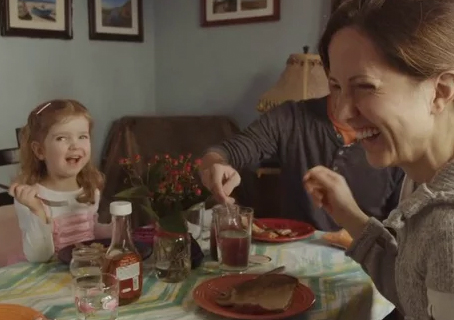Of course, it’s the food that gets everyone to the table, but isn’t it the conversation and the stories that keep us there? The many documented benefits of family dinners don’t derive from how many hours you spend cooking the dinner and it doesn’t matter if you use heirloom parsnips. No, it’s almost certainly the conversation around the table that we have to thank for all those benefits to our health and well-being.
Conversations come in several different flavors: Questions that ask about the day, storytelling, and games.
Questions About the Day
A steady diet of “how was your day” questions can be tedious for both the asker and responder, like being served chicken night after night. Just as it’s interesting to switch up your menu, here are a few questions to add some variety to dinner talk:
- Rose and Thorn
- Two Truths and a Tall Tale
- Conversation Jar – On slips of paper, write a whole slew of questions. Then stuff them in a jar that sits in the middle of the table. Each person can pull one out and answer it. For questions and ideas, check out our Conversation Starters.
Telling Stories
No matter what age we are, telling stories, often with the input of others, is the primary way we make sense of the world. Families used to have lots of opportunities to tell stories — around the fire, while doing needlepoint, or in long letters. But in twenty-first century America, the primary place where families get to tell stories is at the dinner table. According to several studies, storytelling has a positive connection to children’s well-being. Kids who know family stories feel connected to something bigger than themselves.
You can tell stories about:
- How you chose your child’s name
- A holiday or celebration
- When you were the same age as your child
- A pet’s mischief or “humanness”
- Overcoming a challenge
- How your family first came to this country, city, neighborhood
- A love affair, or where and how your parents met
- Something funny or ridiculous
- When you learned an important life lesson
- How you learned a family recipe
Don’t be afraid to tell stories about failures and mishaps, especially if they were ultimately overcome. These “making a silk purse out of a sow’s ear” or “lemonade out of lemons” tales are often the most powerful family stories.
Playing Games at the Table
The point of playing games at the table is to help stretch the time at dinner for more laughs and conversation. These games are fun to play in their own right, but they can also jumpstart discussions at the dinner table.
- Twenty Questions
- Would You Rather?
- Guess the Title
- Name that Tune
- Higglety Pigglety
- Fruit and Vegetable Game
Love Family Dinner
With all of these table talk suggestions, the point is to have fun and encourage conversation, so that dinnertime is a relaxing time when everyone talks. As a bonus, perhaps your kids will linger longer or you will discover something new about each other.
A version of this article originally appeared on DrGreene.com.
